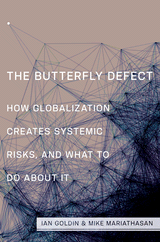Transcript
Podcast produced and presented by Craig Barfoot
The past 25 years have witnessed the most rapid economic and social development the world has ever seen.
In our increasingly globalised world, if something happens in one place, the aftershocks move quickly around the globe. Globalisation creates systemic risks.
Professor Ian Goldin,Director of the Oxford Martin School, University ofOxford. and author, with Mike Mariathasan, of The Butterfly Defect: How globalization creates systemic risks, and what to do about It talks to Craig Barfoot about the joys and perils of gloabalisation.
By any measure – life expectancy, nutrition, infant mortality, income – we see improvements. But the unintended consequences of hyper globalisation such as microbial resistance, obesity, water shortages, climate change, as well as the threats from hyper complexity and integration – growing inequality, cyber attack, terrorist attack, pandemics and financial crises suggest that the gap between the world’s ability to control its affairs, and what is happening on the ground, is widening.
If we look backwards at globalisation, the glass if half full – there has been significant progress. But if we look forward 25 years and ask is this progress likely to be sustained, the answer is probably not, it is essential that we learn to manage globalisation and the systemic risks it poses.
A systemic risk is one that cascades across sectoral boundaries – it is not confined to an industrial or commercial sector, or a country. The 2008 financial crisis was the first systemic risk, it started with the banking industry, but crossed industrial boundaries, flattening industries and putting people out of work, and it fanned out across national borders.
The financial crisis should be seen as a wake up call. We need to learn from the financial crisis, put in place the necessary reforms. But the lessons have not been learned and it is likely that there will be another financial crisis.
The Butterfly Defect looks in detail at the financial crisis, but transposes some of the lessons to potential crises involving pandemics, infrastructure, supply chains, ecology, environment and business systems.
The question is, how do we manage complexity and prevent our hyper connected systems leading to contagion and risk? How, for example, do we ensure that airports are places for conveying people and prevent them becoming places that convey pandemics?
Part of the answer lies in understanding the nature of the risks we face. For example, we must ensure that no place, as well as no industry, is too big to fail. Much risk has become geographically concentrated (eg servers in Nevada, banks in Wall Street).
It is also crucial that our international institutions are up to the challenges posed by globalisation – the World Health Organisation, the World Bank, the United Nations, for example. At present they are not.
Ian Goldin also discusses the paradox of the rise of nationalism in this increasingly globalised world. Many people feel that the world is out of control and respond by trying to put up walls (trade protectionism, anti immigration laws, referenda for leaving the EU ) and go back to an imagined, safer past.
This is Professor Goldin’s second podcast for Pod Academy. See also Divided Nations: global challenges, global governance
Photo by Lars Plougman
Tags: Fiinancial crisis, Globalisation, Globalization, Pandemics, Systemic risks



I want access to the information of golbalization